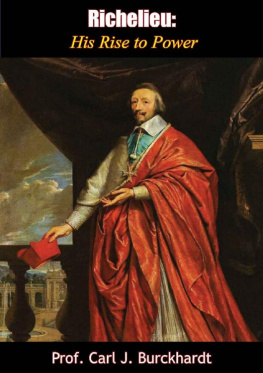THE FAMILY OF DU PLESSIS-THE du Plessis de Richeliue-Career of Franois du Plessis-Birth of Armand Jean-His life at Richeliue-He enters the College of Navarre-Transferred to the Academy-The bishopric of Luon-Armand returns to the University-Consecrated bishop at Rome-He quits Paris for Luon-Motives for this step-Letters to Madame de Bourges His conduct as bishop-His religious attitude-Early relations with Jansenism-Connection with Brulle and Father Joseph-Death of Henry IV.-Richelieu in Paris-Acquaintance with Barbin and Concini-Returns to his diocese-His attitude towards parties at court-Letter to Concini-Election to the States-General-Personal appearance-Feeble health- Character and aims.
THE family of du Plessis has no history. For generations it had lived in provincial obscurity on the borders of Poitou. In the fifteenth century Franois du Plessis, a younger member of the family, inherited the estate of Richelieu from his maternal uncle, Louis de Clrembault. His descendants were the du Plessis de Richelieu, and their chief residence was the castle of that name, situated on the Mable, near the frontier of Poitou and Touraine.
The first member of the family who played any notable part in history was Franois du Plessis, great-grandson of the inheritor of Richelieu. He rendered valuable services to Henry of Anjou during his brief tenure of the crown of Poland, and retained his favour when he returned to France as Henry III. Raised to the dignity of grand provost of France, Franois du Plessis became one of the most prominent and loyal servants of the last of the Valois. When his master died under the dagger of Jacques Clment, it was he who arrested the assassin and took down the depositions of the eye-witnesses.
The death of Henry III. left his Catholic followers in a difficult position. The traditions of his family seemed to impel Franois du Plessis to join the League. But he showed on this occasion a practical foresight worthy of his great son, and at once espoused the cause of Henry of Navarre. He had already gained the confidence of the new king by his bravery at Arques and at Ivry, and had just been appointed captain of the guard, when he was carried off by a fever during the siege of Paris on July 10, 1590.
Franois du Plessis was married to Suzanne de la Porte, daughter of the celebrated avocat, Franois de la Porte, and herself possessed of the practical ability which characterised her family. They had three sons and two daughters, and the youngest child, Armand Jean, was born at Paris in the rue du Boulay, on September 9, 1585. The child was so feeble and sickly that it was not thought safe to have him baptized till May 5, 1586. His god-parents were Marshal Biron, Marshal d Aumont, and his paternal grandmother, Franoise de la Rochechouart.
Armand Jean was only five years old when his father died, and his mother carried her children from the capital to the seclusion of Richelieu. There, amid the disturbances of the civil war between Henry IV. and the League, the boys education was carried on for the next seven years. We have no evidence that he showed any youthful precocity or gave any signs of future greatness. Aubry, who wrote under the auspices of Richelieus relatives, and who would certainly have preserved any family traditions about his hero, tells us nothing of this period of his life, so that we may conclude that there was nothing to tell.
A distant province like Poitou offered few educational advantages in the sixteenth century, and at the age of twelve Armand was sent to Paris, and was admitted to the College of Navarre. There he went through the ordinary courses of grammar and philosophy, and an anecdote of his later years proves that he retained a grateful recollection of this period of his education. In 1597 Jean Yon, one of the philosophical teachers of the College of Navarre, held for the third time the office of Rector of the University, and the young scholar, robed as a chorister, accompanied him on a solemn procession to the tomb of St. Denis. In later days, whenever the University wished to prefer a petition to the all-powerful cardinal, the venerable Yon was always included in the deputation. Richelieu confessed that he never saw his old teacher without a sentiment of respectful fear, and the deputation, even if its request were not granted, was certain of a gracious answer from the minister.
At this time Richelieu was destined for a military career, and he had only received the usual rudimentary education when he was transferred from the College of Navarre to the Acadmie, an institution founded by Antoine de Pluvinel to train the sons of noble families in the exercises and accomplishments which were to fit them for a soldiers life. It was here that Armand acquired the military tastes which never deserted him. He was at all times ready to exchange his cassock for a knights armour, and equally willing to give his advice as to the handling of an army or the construction of a fortress.
The young marquis de Chillon, as he called himself at the Academy, was only seventeen years old when an event occurred which suddenly altered all his aspirations. In 1584 Henry III., in accordance with a practice not uncommon in those days, had granted to Franois du Plessis the disposal of the bishopric of Luon. His widow, left in somewhat straitened circumstances, had found the revenues of the bishopric one of her chief resources. The episcopal functions were exercised in the meantime by one Franois Yver, who was avowedly only a warming-pan until one of the sons could take his place. But the chapter of the diocese resented the diversion of the episcopal revenue to secular and personal uses, and threatened to go to law with M. Yver, whose position was indefensible. In these circumstances Madame de Richelieu determined to procure the appointment of her second son, Alphonse Louis, to the bishopric. From 1595 he is occasionally spoken of as bishop of Luon, though he never really held the office. Suddenly, about 1602, he absolutely refused to seek consecration, became a monk, and entered the Grande Chartreuse. In the next year M. Yver, on the suit of the chapter, was ordered by the parliament to devote a third of the revenue of the bishopric to the repairs of the cathedral and of the episcopal palace.
These events were a great blow to Madame de Richelieu, but she had still one expedient left. By a petition she delayed the enforcement of the decree of parliament, and in the meantime her third son was to assume the position which his brother refused. Armand seems to have made no opposition to his mothers will. In 1603 he quitted the Academy, and resumed his studies at the University. His eldest brother, Henri, was now at court, where Henry IV. had received him with favour as his fathers son, and where he was able to defend the interests of his family. In 1606 the king wrote to the French envoy at Rome, urging him to obtain from the pope the appointment of Armand Jean du Plessis to the bishopric of Luon, although he had not yet reached the canonical age.










